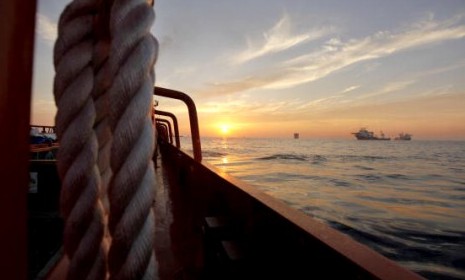What the 'shocking' oil plumes mean for the Gulf
Unexpectedly, scientists have detected vast underwater clumps of coagulated oil near the leak, raising new risks and new questions

A free daily email with the biggest news stories of the day – and the best features from TheWeek.com
You are now subscribed
Your newsletter sign-up was successful
Enormous "plumes" of oil from the BP spill have reportedly been discovered deep in the Gulf of Mexico, raising fears that the leak's effect on marine life could be much worse than anticipated. BP announced early on Monday morning that it had found a way to capture some of the oil, and hoped to fully contain the leak by later in the week. But millions of gallons of oil have already pumped into the Gulf, and the discovery of these "shocking" plumes has led to fears of "dead zones" in the deep water. (Watch an MSNBC report about the discovery of oil plumes.) A quick guide to what the plumes mean:
What are oil plumes?
Clumps of oil that are heavier than water and extend great distances. It's possible, reports The Guardian, that the dispersants BP initially used near the source of the leak caused the oil to coagulate into relatively large clumps that remain suspended below the surface of the sea.
The Week
Escape your echo chamber. Get the facts behind the news, plus analysis from multiple perspectives.

Sign up for The Week's Free Newsletters
From our morning news briefing to a weekly Good News Newsletter, get the best of The Week delivered directly to your inbox.
From our morning news briefing to a weekly Good News Newsletter, get the best of The Week delivered directly to your inbox.
How large are these plumes?
The largest discovered so far is three miles wide and 10 miles long. Scientists examining the leak say the plumes are "abundant throughout the region," located, in some cases, up to 20 miles away from the broken well.
Were they expected?
No. Research scientists and government experts anticipated the oil would rise to the surface of the water.
A free daily email with the biggest news stories of the day – and the best features from TheWeek.com
What do plumes of oil do?
Unlike the surface oil, the deepwater oil depletes the oxygen in the sea water. If the oxygen level drops too low, "dead zones" could develop where no marine life would survive. Scientists say the oxygen levels in that region of the Gulf have dropped 30 percent since the well began leaking.
How devastating could the effects on marine life be?
The plumes could poison and suffocate all kinds of sea life for up to a decade, according to Samantha Joye, a professor of marine sciences at the University of Georgia quoted by the AP. The combination of oily water and oxygen depletion in the lower depths can "interrupt the food chain at the lowest level, and will trickle up [the chain]." Whales, dolphins and tuna could all be affected.
How many plumes are there?
At this point, no one knows. BP says it is focusing on stopping the leak before allowing scientists to calculate the amount of oil in the water. "It’s not relevant to the response effort, and it might even detract from the response effort," a spokesperson told The New York Times.
Sources: The New York Times, Guardian, AP, Firedoglake, Reuters